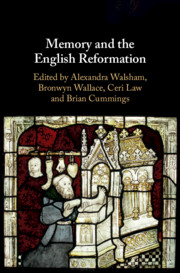Book contents
- Memory and the English Reformation
- Memory and the English Reformation
- Copyright page
- Dedication
- Contents
- Figures
- Contributors
- Preface and Acknowledgements
- Abbreviations
- Introduction
- Part I Events and Temporalities
- Part II Objects and Places
- Part III Lives and Afterlives
- 13 Compromise Refashioned
- 14 History, Heresy and Henry V
- 15 The Letters of the Martyrs
- 16 Competing Lives and Contested Objects
- 17 Visual Memory, Portraiture and the Protestant Credentials of Tudor and Stuart Families
- 18 Legends, Shrines and Ruined Tombs
- Part IV Rituals and Bodies
- Index
13 - Compromise Refashioned
Memory and Life-Writing in Matthew Parker’s Roll
from Part III - Lives and Afterlives
Published online by Cambridge University Press: 30 October 2020
- Memory and the English Reformation
- Memory and the English Reformation
- Copyright page
- Dedication
- Contents
- Figures
- Contributors
- Preface and Acknowledgements
- Abbreviations
- Introduction
- Part I Events and Temporalities
- Part II Objects and Places
- Part III Lives and Afterlives
- 13 Compromise Refashioned
- 14 History, Heresy and Henry V
- 15 The Letters of the Martyrs
- 16 Competing Lives and Contested Objects
- 17 Visual Memory, Portraiture and the Protestant Credentials of Tudor and Stuart Families
- 18 Legends, Shrines and Ruined Tombs
- Part IV Rituals and Bodies
- Index
Summary
This chapter examines the memory of those who conformed and compromised – so-called ‘Nicodemites’ – in the English Reformation. It takes as its starting point and central case study Matthew Parker (1504-75), the first Elizabethan archbishop of Canterbury, and his self-memorialisation in his memorial roll, a curious document which has often been described as autobiographical. The chapter considers the format, content and purpose of this unique manuscript, focusing particularly on the section dealing with Parker’s life during the reign of Mary I (1553-8) and the restoration of Roman Catholicism in England; a period in which Parker, unlike many other celebrated Protestants, was neither a martyr nor an exile, choosing instead the partial compromise of remaining in his newly hostile homeland. Both Parker himself and then his subsequent presented these years as either a period of inner spiritual constancy or as a time of suffering, a quasi-martyrdom. This, the chapter argues, reflects and illuminates a much larger process in which individual compromise was rewritten or forgotten in the creation of a larger, collective cultural memory of Protestant resistance and triumph.
Keywords
- Type
- Chapter
- Information
- Memory and the English Reformation , pp. 257 - 270Publisher: Cambridge University PressPrint publication year: 2020
- 1
- Cited by

